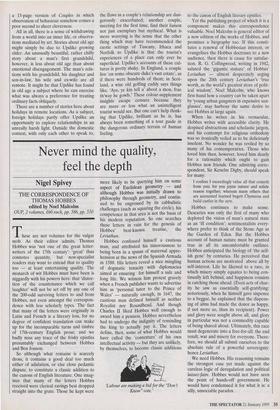Never mind the quality, feel the depth
Nigel Spivey
THE CORRESPONDENCE OF THOMAS HOBBES edited by Noel Malcolm OUP, 2 volumes, £60 each, pp. 586, pp. 510 These are not volumes for the vulgar mob. As their editor admits, Thomas Hobbes was 'not one of the great letter- writers of the 17th century': 'great' thus connotes quantity, but non-specialist readers may want to extend that to quality too — at least entertaining quality. The monarch of wit Hobbes must have been is niggardly with his powers here: that 'distor- tion of the countenance which we call laughter' will not be set off by any one of the 200-odd surviving letters to and from Hobbes, not even amongst the correspon- dence with less scholarly types. The fact that many of the letters were originally in Latin and French is a literary loss, for no degree of confident translation can make up for the incomparable turns and timbre of 17th-century English prose; and we badly miss any trace of the frisky epistles presumably exchanged between Hobbes and Ben Jonson.
So although what remains is scarcely dross, it contains a good deal too much either of adulation, or else close pedantic dispute, to constitute a classic addition to the canons of English literature. One imag- ines that many of the letters Hobbes received were clerical ravings best dropped straight into the grate. Those he kept were more likely to be querying him on some aspect of Euclidean geometry — and although Hobbes was initially drawn to philosophy through geometry, and contin- ued to be engrossed by its cabbalistic challenges (such as squaring the circle), his competence in that area is not the basis of his modern reputation. So one searches these letters in vain for the genesis of Hobbes' best-known. treatise, the Leviathan.
Hobbes confessed himself a cautious man, and attributed his timorousness to being born in a spasm of maternal appre- hension at the news of the Spanish Armada in 1588. His letters reveal a nice mingling of dogmatic tenacity with diplomacies aimed at ensuring for himself a safe and long life. We witness him protest gravely when a French publisher wants to advertise him as 'personal tutor to the Prince of Wales' — naturally enough, in 1647, the cautious man defined himself as neither Royalist nor Roundhead. And though Charles II liked Hobbes well enough to award him a pension, Hobbes nevertheless had to undergo the indignity of reminding the king to actually pay it. The letters define, then, some of what Hobbes would have called the 'contexture' of his own intellectual activity — but they are unlikely, by themselves, to become classic additions `Labour are making a bid for the "Don't Know" vote.' to the canon of English literary epistles.
Yet the publishing project'of which it is a component makes this correspondence valuable. Noel Malcolm is general editor of a new edition of the works of Hobbes, and promises a biography too. If this consti- tutes a renewal of Hobbesian interest, or evangelises the Hobbes doctrines to a new audience, then there is cause for satisfac- tion. R. G. Collingwood, writing in 1942, saluted the 'gigantic stature' of Hobbes' Leviathan — almost desperately urging upon the 20th century Leviathan's 'true worth, as the world's greatest store of polit- • ical wisdom'. Noel Malcolm, who knows first-hand how a country can be taken apart by 'young urban gangsters in expensive sun- glasses', may harbour the same desire to see Hobbes at large again.
When he writes in his vernacular, Hobbes writes with accessible clarity. He despised abstractions and scholastic jargon, and his contempt for religious orthodoxy was so ironically veiled as to be deliciously insolent. No wonder he was reviled by so many of his contemporaries. Those who loved him then, however, loved him dearly for a rationality which ought to gain Hobbes new friends. One admiring corre- spondent, Sir Kenelm Digby, should speak for many: I confess I exceedingly value all that cometh from you; for you joyne nature and solide reason together; whereas many others that are accounted learned begett Chymeras and build castles in the ayre.
Hobbes continues to make sense. Descartes was only the first of many who deplored the vision of man's natural state as an 'ill condition'; sentimentalists every- where prefer to think of the Stone Age as the Garden of Eden. But the Hobbes account of human nature must be granted true in all its uncomfortable outlines. Hobbes anticipated the biology of 'the self- ish gene' by centuries. He perceived that human actions are motivated above all by self-interest. Life he likened to a race, in which misery simply equates to being con- tinually left behind, and happiness consists in catching those ahead. (Even acts of char- ity he saw as essentially self-gratifying: notoriously, when he himself gave sixpence to a beggar, he explained that the dispens- ing of alms had made the donor as happy, if not more so, than its recipient). Power and glory were sought above all, and glory in particular was not a commodity capable of being shared about. Ultimately, this race must degenerate into a free-for-all: the end result, war and misery for everyone. There- fore, we should all submit ourselves to the absolute rule of a powerful sovereignty: hence Leviathan.
We need Hobbes. His reasoning remains the strongest case yet made against the careless logic of deregulation and political laissez faire. Hobbes would not have seen the point of hands-off government. He would have condemned it for what it is: a silly, unsociable paradox.


























































 Previous page
Previous page